人教新目标(Go for it)版八年级上册 Unit 2 How often do you exercise?Section B 3a-Self Check 课件 (共20张PPT)
文档属性
| 名称 | 人教新目标(Go for it)版八年级上册 Unit 2 How often do you exercise?Section B 3a-Self Check 课件 (共20张PPT) | 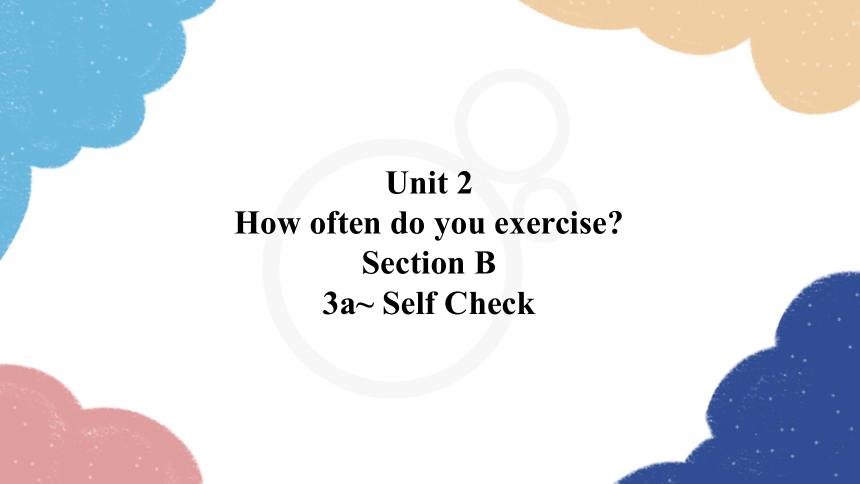 | |
| 格式 | pptx | ||
| 文件大小 | 982.4KB | ||
| 资源类型 | 教案 | ||
| 版本资源 | 人教新目标(Go for it)版 | ||
| 科目 | 英语 | ||
| 更新时间 | 2023-08-10 23:42:47 | ||
图片预览

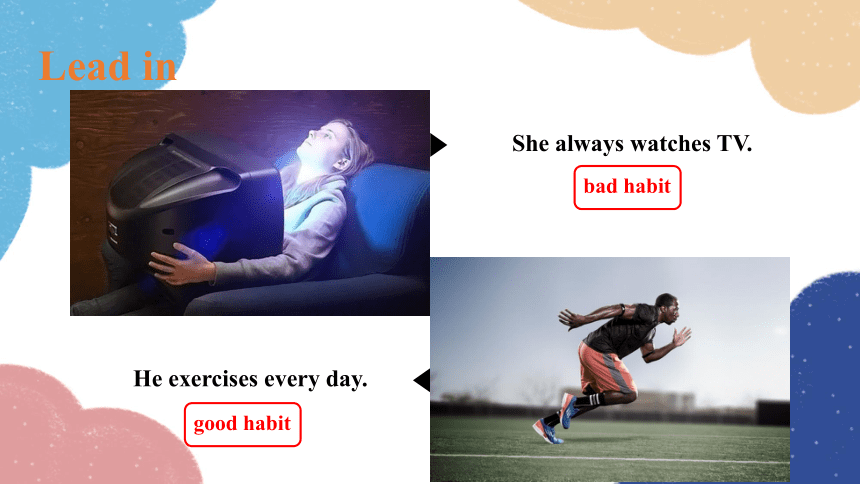


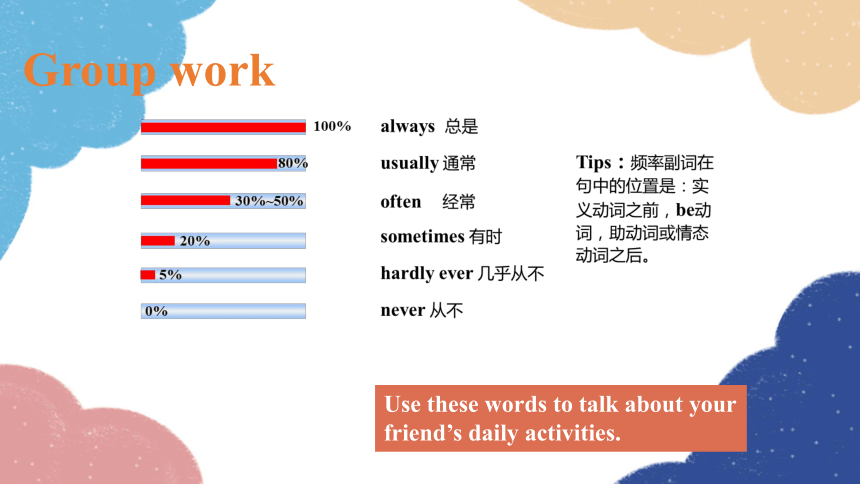
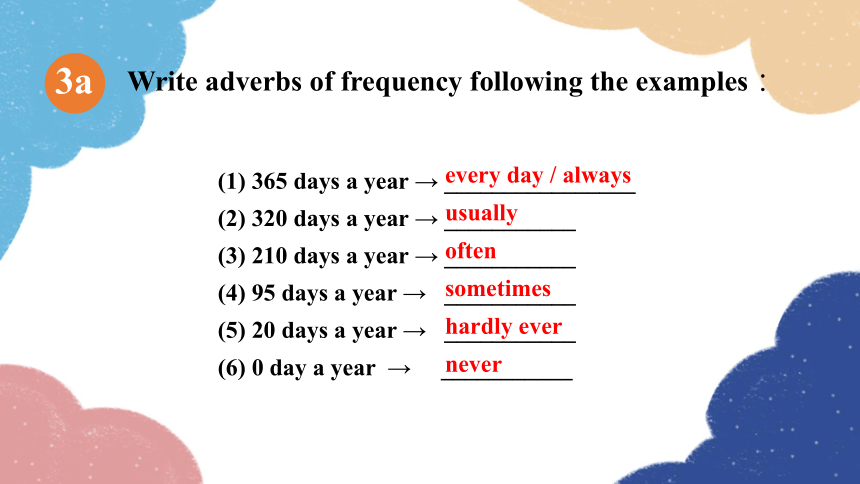
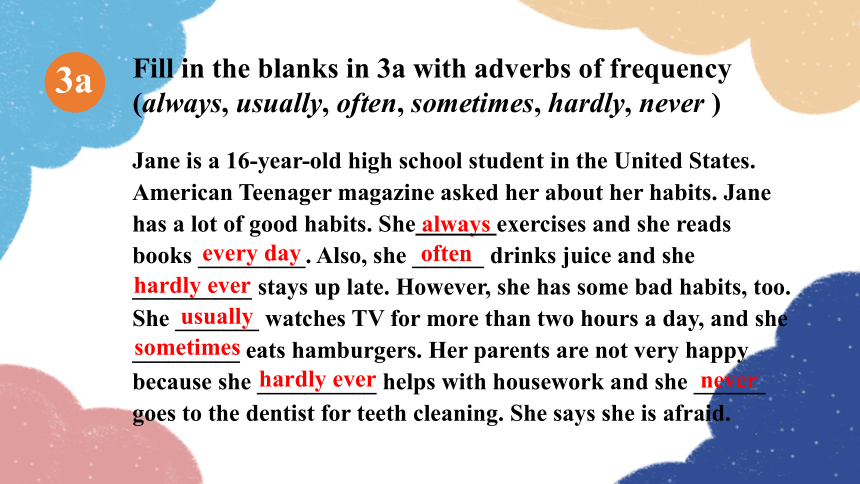
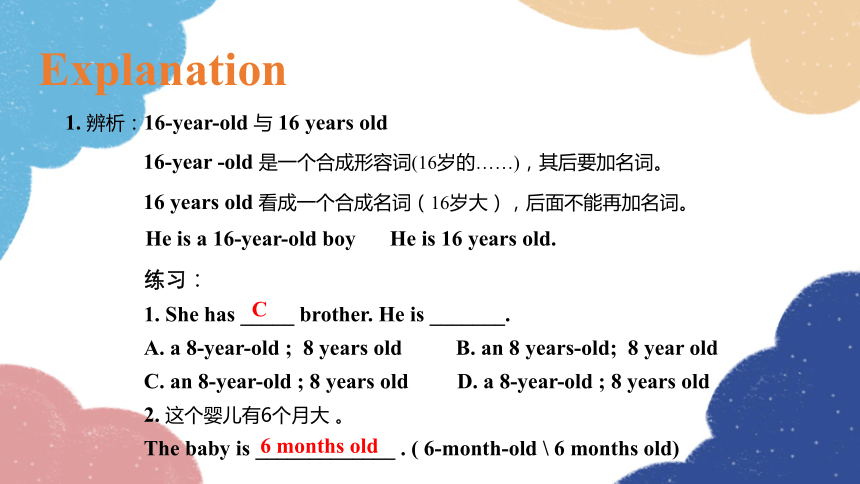

文档简介
(共20张PPT)
Unit 2
How often do you exercise
Section B
3a~ Self Check
She always watches TV.
He exercises every day.
good habit
bad habit
Lead in
Talk about your friend’s habits with your partner. Judge which ones are good and which ones are bad.
Lead in
100%
80%
30%~50%
20%
5%
0%
Review
always 总是
usually 通常
often 经常
sometimes 有时
hardly ever 几乎从不
never 从不
Tips:频率副词在句中的位置是:实义动词之前,be动词,助动词或情态动词之后。
Group work
Use these words to talk about your friend’s daily activities.
3a
Write adverbs of frequency following the examples:
(1) 365 days a year → ________________
(2) 320 days a year → ___________
(3) 210 days a year → ___________
(4) 95 days a year → ___________
(5) 20 days a year → ___________
(6) 0 day a year → ___________
every day / always
usually
often
sometimes
hardly ever
never
3a
Fill in the blanks in 3a with adverbs of frequency (always, usually, often, sometimes, hardly, never )
Jane is a 16-year-old high school student in the United States. American Teenager magazine asked her about her habits. Jane has a lot of good habits. She always exercises and she reads books _________. Also, she ______ drinks juice and she __________ stays up late. However, she has some bad habits, too. She _______ watches TV for more than two hours a day, and she _________ eats hamburgers. Her parents are not very happy because she __________ helps with housework and she ______ goes to the dentist for teeth cleaning. She says she is afraid.
every day
often
hardly ever
usually
sometimes
hardly ever
never
Explanation
1. 辨析:16-year-old 与 16 years old
16-year -old 是一个合成形容词(16岁的……),其后要加名词。
He is a 16-year-old boy
He is 16 years old.
16 years old 看成一个合成名词(16岁大),后面不能再加名词。
练习:
1. She has _____ brother. He is _______.
A. a 8-year-old ; 8 years old B. an 8 years-old; 8 year old
C. an 8-year-old ; 8 years old D. a 8-year-old ; 8 years old
2. 这个婴儿有6个月大 。
The baby is _____________ . ( 6-month-old \ 6 months old)
C
6 months old
2. 辨析:however 与 but
but 并列连词 “然而,但是”。 可直接连接前后两个句子,表转折关系。
however 副词 “然而,但是”。 不能直接连接句子,必须用逗号与句子隔开。
练习:
1. It began to rain, , we went out to look for the boy.
天开始下雨了,但我们还是出去寻找那个男孩了。
2. It a sunny morning, it’s very cold.
这是个晴朗的早晨,但是却很冷。
however
but
Explanation
3. more than, less than
more than =_______。意为“超过,多余, 不仅仅”。
over
less than 意为“不到,少于”。
反义词
练习:
1. There are________________ 2000 books here.
在这里有超过两千本书。
2. She sleeps ___________ seven hours every night.
她每晚的睡眠时间不到7小时。
less than
more than / over
Explanation
4. afraid
1. be afraid to do sth. 害怕做某事
I am afraid to travel by plane. 我害怕乘飞机旅行。
2. be afraid of sb./ sth. 害怕某人/某物
She is afraid of the dog. 她害怕那只狗。
3. be afraid of doing sth. 害怕做某事
Don’t be afraid of asking questions. 不要怕问问题。
练习:不要害怕向别人求助。
______ ___ afraid of _______ _____ help from others.
= _____ ____ afraid to ____ ____ help from others.
Don’t be
asking for
Don’t be
ask for
Explanation
3b
Complete the chart with your own information. In the last column, use expressions like always, every day, twice a week and never.
Good habits
Bad habits
Activities
How often
3c
Write a report about your good and bad habits. Say how often you do things. Use the report in 3a as an example.
________________________________________
________________________________________
________________________________________
________________________________________
The writing steps
(1) I am a ××-year-old middle school student.
(2) I have a lot of good habits. …
(3) However, I have some bad habits, too. …
1. 时态:一般现在时。 人称:用第一人称。
2. 注意事项:将一项活动和其频率结合起来,从而判断它是否健康。如:help with housework是一个好习惯,但如果一年只做几次,就不是一个好习惯。
4
Take the healthy pare your results with your partner’s.
Who’s healthier
1. How often do you eat breakfast
a. Never b. A few minutes a week c. Almost every day.
2. How often do you eat fast food
a. Never b. A few minutes a week c. Almost every day
3. How often do you eat vegetables and fruit
a. Never b. A few minutes a week c. Almost every day
4. How often do you exercise
a. A few minutes a year b. A few minutes a month
c. A few minutes a week
5. How many hours do you watch TV every week
a. None b. One to four c. Five or more
6. How many hours do you usually sleep at night
a. Less than six. b. Six or seven c. Eight or more
1. a=0, b=1, c=2 2. a=2, b=1, c=0
3. a=0, b=1, c=2 4. a=0, b=1, c=2
5. a=2, b=1, c=0 6. a=0, b=1, c=2
9-12 points:
You're really healthy! Good for you—and your health!
4-8 points:
You're smart about health most of the time.
0-3 points:
You have to learn more about healthy habits. Don't worry—you can do it!
Are you healthy?
Self Check
1. Complete the chart with activities you do and don’t do.
What about your mother/father
I
My mother or father
always
usually
often
sometimes
hardly ever
never
Self Check
2. Write five sentences using the information above.
________________________________________
________________________________________
________________________________________
________________________________________
________________________________________
Self Check
3. Fill in the blanks in the conversation.
A: What do Tom and Mike ________ do on weekends
B: They sometimes go to the museum.
A: _________ do they go to the shopping center
B: ______ ever. Maybe about twice a month.
A: _________ do they watch TV
B: Mike never watches TV, but Tom watches TV ______ day.
A: Oh, I’m just like Tom. I ______ watch TV, too.
usually
How often
Hardly
How often
every
always
Homework
1. Remember the word and expressions in this unit.
2. Ask your father or mother about the answers you write in Self Check 1. If your answers are right, tell your father or mother what he or she should do in the future.
Unit 2
How often do you exercise
Section B
3a~ Self Check
She always watches TV.
He exercises every day.
good habit
bad habit
Lead in
Talk about your friend’s habits with your partner. Judge which ones are good and which ones are bad.
Lead in
100%
80%
30%~50%
20%
5%
0%
Review
always 总是
usually 通常
often 经常
sometimes 有时
hardly ever 几乎从不
never 从不
Tips:频率副词在句中的位置是:实义动词之前,be动词,助动词或情态动词之后。
Group work
Use these words to talk about your friend’s daily activities.
3a
Write adverbs of frequency following the examples:
(1) 365 days a year → ________________
(2) 320 days a year → ___________
(3) 210 days a year → ___________
(4) 95 days a year → ___________
(5) 20 days a year → ___________
(6) 0 day a year → ___________
every day / always
usually
often
sometimes
hardly ever
never
3a
Fill in the blanks in 3a with adverbs of frequency (always, usually, often, sometimes, hardly, never )
Jane is a 16-year-old high school student in the United States. American Teenager magazine asked her about her habits. Jane has a lot of good habits. She always exercises and she reads books _________. Also, she ______ drinks juice and she __________ stays up late. However, she has some bad habits, too. She _______ watches TV for more than two hours a day, and she _________ eats hamburgers. Her parents are not very happy because she __________ helps with housework and she ______ goes to the dentist for teeth cleaning. She says she is afraid.
every day
often
hardly ever
usually
sometimes
hardly ever
never
Explanation
1. 辨析:16-year-old 与 16 years old
16-year -old 是一个合成形容词(16岁的……),其后要加名词。
He is a 16-year-old boy
He is 16 years old.
16 years old 看成一个合成名词(16岁大),后面不能再加名词。
练习:
1. She has _____ brother. He is _______.
A. a 8-year-old ; 8 years old B. an 8 years-old; 8 year old
C. an 8-year-old ; 8 years old D. a 8-year-old ; 8 years old
2. 这个婴儿有6个月大 。
The baby is _____________ . ( 6-month-old \ 6 months old)
C
6 months old
2. 辨析:however 与 but
but 并列连词 “然而,但是”。 可直接连接前后两个句子,表转折关系。
however 副词 “然而,但是”。 不能直接连接句子,必须用逗号与句子隔开。
练习:
1. It began to rain, , we went out to look for the boy.
天开始下雨了,但我们还是出去寻找那个男孩了。
2. It a sunny morning, it’s very cold.
这是个晴朗的早晨,但是却很冷。
however
but
Explanation
3. more than, less than
more than =_______。意为“超过,多余, 不仅仅”。
over
less than 意为“不到,少于”。
反义词
练习:
1. There are________________ 2000 books here.
在这里有超过两千本书。
2. She sleeps ___________ seven hours every night.
她每晚的睡眠时间不到7小时。
less than
more than / over
Explanation
4. afraid
1. be afraid to do sth. 害怕做某事
I am afraid to travel by plane. 我害怕乘飞机旅行。
2. be afraid of sb./ sth. 害怕某人/某物
She is afraid of the dog. 她害怕那只狗。
3. be afraid of doing sth. 害怕做某事
Don’t be afraid of asking questions. 不要怕问问题。
练习:不要害怕向别人求助。
______ ___ afraid of _______ _____ help from others.
= _____ ____ afraid to ____ ____ help from others.
Don’t be
asking for
Don’t be
ask for
Explanation
3b
Complete the chart with your own information. In the last column, use expressions like always, every day, twice a week and never.
Good habits
Bad habits
Activities
How often
3c
Write a report about your good and bad habits. Say how often you do things. Use the report in 3a as an example.
________________________________________
________________________________________
________________________________________
________________________________________
The writing steps
(1) I am a ××-year-old middle school student.
(2) I have a lot of good habits. …
(3) However, I have some bad habits, too. …
1. 时态:一般现在时。 人称:用第一人称。
2. 注意事项:将一项活动和其频率结合起来,从而判断它是否健康。如:help with housework是一个好习惯,但如果一年只做几次,就不是一个好习惯。
4
Take the healthy pare your results with your partner’s.
Who’s healthier
1. How often do you eat breakfast
a. Never b. A few minutes a week c. Almost every day.
2. How often do you eat fast food
a. Never b. A few minutes a week c. Almost every day
3. How often do you eat vegetables and fruit
a. Never b. A few minutes a week c. Almost every day
4. How often do you exercise
a. A few minutes a year b. A few minutes a month
c. A few minutes a week
5. How many hours do you watch TV every week
a. None b. One to four c. Five or more
6. How many hours do you usually sleep at night
a. Less than six. b. Six or seven c. Eight or more
1. a=0, b=1, c=2 2. a=2, b=1, c=0
3. a=0, b=1, c=2 4. a=0, b=1, c=2
5. a=2, b=1, c=0 6. a=0, b=1, c=2
9-12 points:
You're really healthy! Good for you—and your health!
4-8 points:
You're smart about health most of the time.
0-3 points:
You have to learn more about healthy habits. Don't worry—you can do it!
Are you healthy?
Self Check
1. Complete the chart with activities you do and don’t do.
What about your mother/father
I
My mother or father
always
usually
often
sometimes
hardly ever
never
Self Check
2. Write five sentences using the information above.
________________________________________
________________________________________
________________________________________
________________________________________
________________________________________
Self Check
3. Fill in the blanks in the conversation.
A: What do Tom and Mike ________ do on weekends
B: They sometimes go to the museum.
A: _________ do they go to the shopping center
B: ______ ever. Maybe about twice a month.
A: _________ do they watch TV
B: Mike never watches TV, but Tom watches TV ______ day.
A: Oh, I’m just like Tom. I ______ watch TV, too.
usually
How often
Hardly
How often
every
always
Homework
1. Remember the word and expressions in this unit.
2. Ask your father or mother about the answers you write in Self Check 1. If your answers are right, tell your father or mother what he or she should do in the future.
同课章节目录
- Unit 1 Where did you go on vacation?
- Section A
- Section B
- Unit 2 How often do you exercise?
- Section A
- Section B
- Unit 3 I'm more outgoing than my sister.
- Section A
- Section B
- Unit 4 What's the best movie theater?
- Section A
- Section B
- Unit 5 Do you want to watch a game show?
- Section A
- Section B
- Unit 6 I'm going to study computer science.
- Section A
- Section B
- Unit 7 Will people have robots?
- Section A
- Section B
- Unit 8 How do you make a banana milk shake?
- Section A
- Section B
- Unit 9 Can you come to my party?
- Section A
- Section B
- Unit 10 If you go to the party, you'll have a grea
- Section A
- Section B
